Evaluierung von Subventionsprogrammen
Diese Forschungsgruppe untersucht die Effekte von Produktions- und Wissensnetzwerken auf die Produktivität von Unternehmen und Regionen. Darüber hinaus werden Wirkungen staatlicher Förderprogramme für Forschung und Entwicklung sowie regionalpolitischer Programme auf die Leistungsfähigkeit von Unternehmen und Regionen evaluiert.
Zentrum für evidenzbasierte Politikberatung (IWH-CEP)
Forschungscluster
Wirtschaftliche Dynamik und StabilitätIhr Kontakt

Mitglied - Abteilung Präsidialbereich
PROJEKTE
09.2019 ‐ 09.2022
Etablierung einer evidenzbasierten Evaluationskultur für industriepolitische Fördermaßnahmen in Deutschland (EVA-KULT)
Europäischer Fonds für regionale Entwicklung (EFRE)
Das Vorhaben dient dem Ausbau des Zentrums für evidenzbasierte Politikberatung am Leibniz-Institut für Wirtschaftsforschung Halle (IWH-CEP).
01.2018 ‐ 12.2020
Vernetzt wachsen - Innovatives Sachsen-Anhalt durch digitale Geschäftsmodelle (Kompetenzzentrum 4.0)
Bundesministerium für Wirtschaft und Energie (BMWi)
01.2017 ‐ 12.2018
Politische Partizipation in Ostdeutschland
Bundesministerium für Wirtschaft und Energie (BMWi)
12.2015 ‐ 11.2018
Sozioökonomische Effekte der Erforschung innovativer Ansätze für die POC-Diagnostik
Bundesministerium für Bildung und Forschung (BMBF)
Teilvorhaben im Verbundprojekt “POC-Sensorplattform für chronisch-entzündliche Atemwegserkrankungen (EXASENS)”. Neun Leibniz-Institute arbeiten gemeinsam im Pilotprojekt EXASENS an der Erforschung einer Point-of-Care-Technologie zur Vorhersage und Diagnose von chronisch-entzündlichen Atemwegserkrankungen. Der Verbund wird vom Bundesministerium für Bildung und Forschung (BMBF) mit 6,25 Millionen Euro gefördert und liefert einen Beitrag zum Ausbau und zur Stärkung des Themenfeldes Gesundheitstechnologien.
Vgl. Pressemitteilung des Leibniz-Institut für Photonische Technologien (IPHT), Jena.
02.2017 ‐ 02.2018
Bedeutung außeruniversitärer Forschungseinrichtungen für die Entwicklung von Betrieben und Regionen
Bundesministerium für Bildung und Forschung (BMBF)
01.2015 ‐ 12.2016
Evaluierung der GRW-Förderung in Sachsen-Anhalt
Investitionsbank Sachsen-Anhalt
Referierte Publikationen
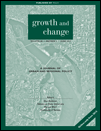
Actors and Interactions – Identifying the Role of Industrial Clusters for Regional Production and Knowledge Generation Activities
in: Growth and Change, Nr. 2, 2014
Abstract
This paper contributes to the empirical literature on systematic methodologies for the identification of industrial clusters. It combines a measure of spatial concentration, qualitative input–output analysis, and a knowledge interaction matrix to identify the production and knowledge generation activities of industrial clusters in the Federal State of Saxony in Germany. It describes the spatial allocation of the industrial clusters, identifies potentials for value chain industry clusters, and relates the production activities to the activities of knowledge generation in Saxony. It finds only a small overlap in the production activities of industrial clusters and general knowledge generation activities in the region, mainly driven by the high-tech industrial cluster in the semiconductor industry. Furthermore, the approach makes clear that a sole focus on production activities for industrial cluster analysis limits the identification of innovative actors.
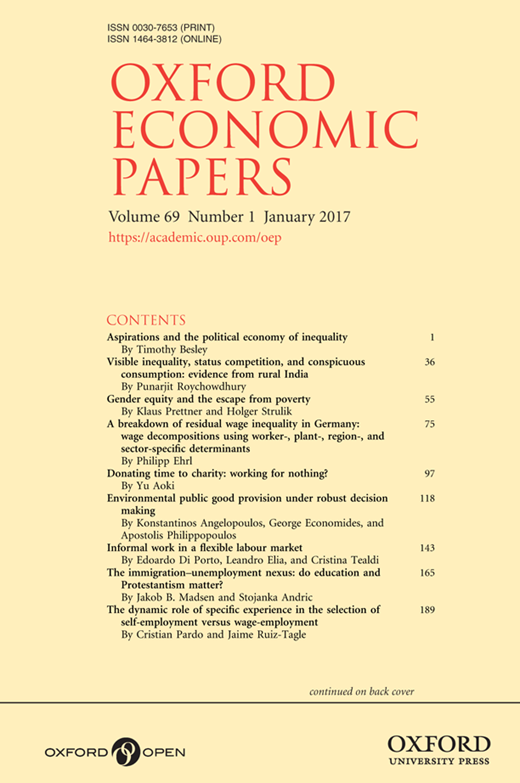
Non-union Worker Representation, Foreign Owners, and the Performance of Establishments
in: Oxford Economic Papers, Nr. 1, 2014
Abstract
Using German establishment data, this study provides the first econometric analysis on the interaction of establishment-level codetermination and foreign owners. Works councils are associated with higher productivity in domestic-owned establishments while they are associated with lower productivity in foreign-owned establishments. Our results conform to the notion that foreign ownership can involve strong tensions with the institutional patterns of the host country.
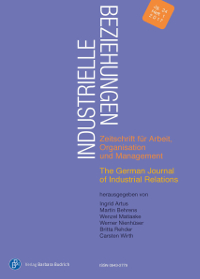
Die Anpassung des betrieblichen Leiharbeitseinsatzes vor und während der Wirtschaftskrise der Jahre 2008 und 2009
in: Industrielle Beziehungen, Nr. 1, 2014
Abstract
Der Anstieg in der Leiharbeitsnutzung in Deutschland bis zur Wirtschaftskrise der Jahre 2008 und 2009 war geprägt durch die verstärkte Nutzung in größeren Industriebetrieben und vollzog sich in erster Linie entlang der intensive margin, also durch eine erhöhte Leiharbeitsintensität in den Nutzerbetrieben. Diese Vorgänge können mit transaktionskostentheoretischen Argumenten und gestiegenem internationalen Wettbewerbsdruck erklärt werden, und sie deuten auf eine gestiegene Produktivität in den Nutzerbetrieben hin. Der drastische Rückgang in der Leiharbeitsnutzung während der Krise betraf vor allem Exporteure und größere Industriebetriebe und vollzog sich primär entlang der extensive margin. Die Beschäftigungschancen im Leiharbeitssektor hingen in besonders starkem Maße von der internationalen Nachfrage nach deutschen Industriegütern ab.
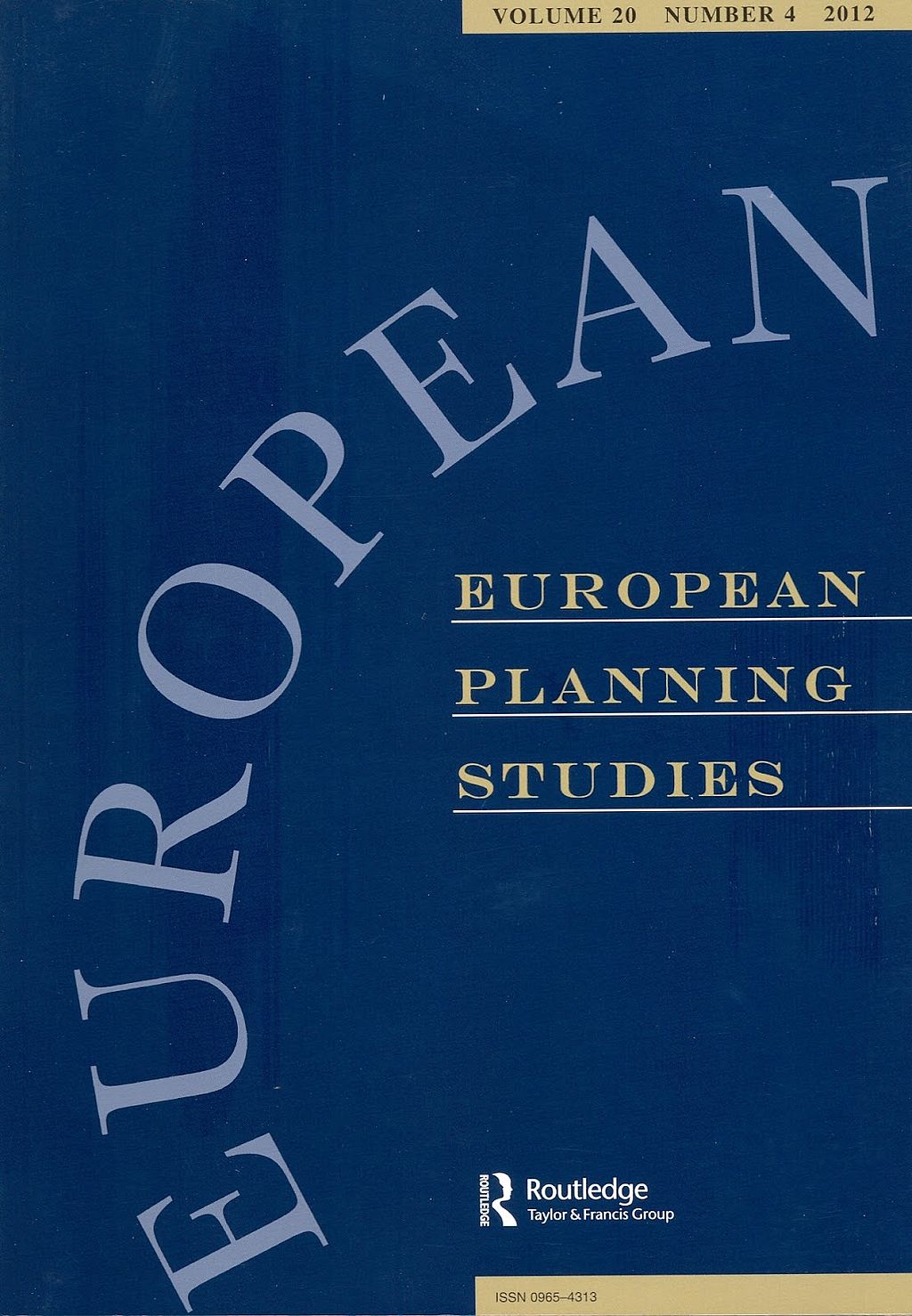
Guest Editorial: Which Regions Benefit from Emerging Industries?
in: European Planning Studies, Nr. 11, 2013
Publikation lesen
The Impact of R&D Collaboration Networks on the Performance of Firms and Regions: A Meta-analysis of the Evidence
in: International Journal of Networking and Virtual Organisations, Nr. 4, 2013
Abstract
Wissensintensive Interaktionen sind mit einer Reihe von Vor- und Nachteilen für die beteiligten Akteure verbunden. Deshalb hat sich ein Literaturstrang entwickelt, welcher der Fragestellung nachgeht, wie sich FuE-Kooperationen auf die Leistungsfähigkeit von Firmen und Regionen auswirken. Diese Studien kommen zu unterschiedlichen Ergebnissen. Das Papier versucht die verschiedenen Ergebnisse der Literatur zusammenzufassen. Ein weiteres Ziel ist es, die in der Literatur verwendeten Methoden zur Bearbeitung der Fragestellung kritisch zu diskutieren. Zudem geht das Papier der Frage nach, inwiefern die in der Literatur verwendeten Methoden und Ansätze die Ergebnisse der Studien beeinflussen. Zur Bearbeitung dieser Fragestellungen wird eine Metaanalyse der relevanten Literatur durchgeführt. Dabei wird gezeigt, dass FuE-Kooperationen einen positiven Effekt auf die Leistungsfähigkeit von Firmen und Regionen haben. Zudem gibt es starke Evidenz dafür, dass die verwendeten Methoden und Ansätze die Ergebnisse der Studien beeinflussen.
Arbeitspapiere
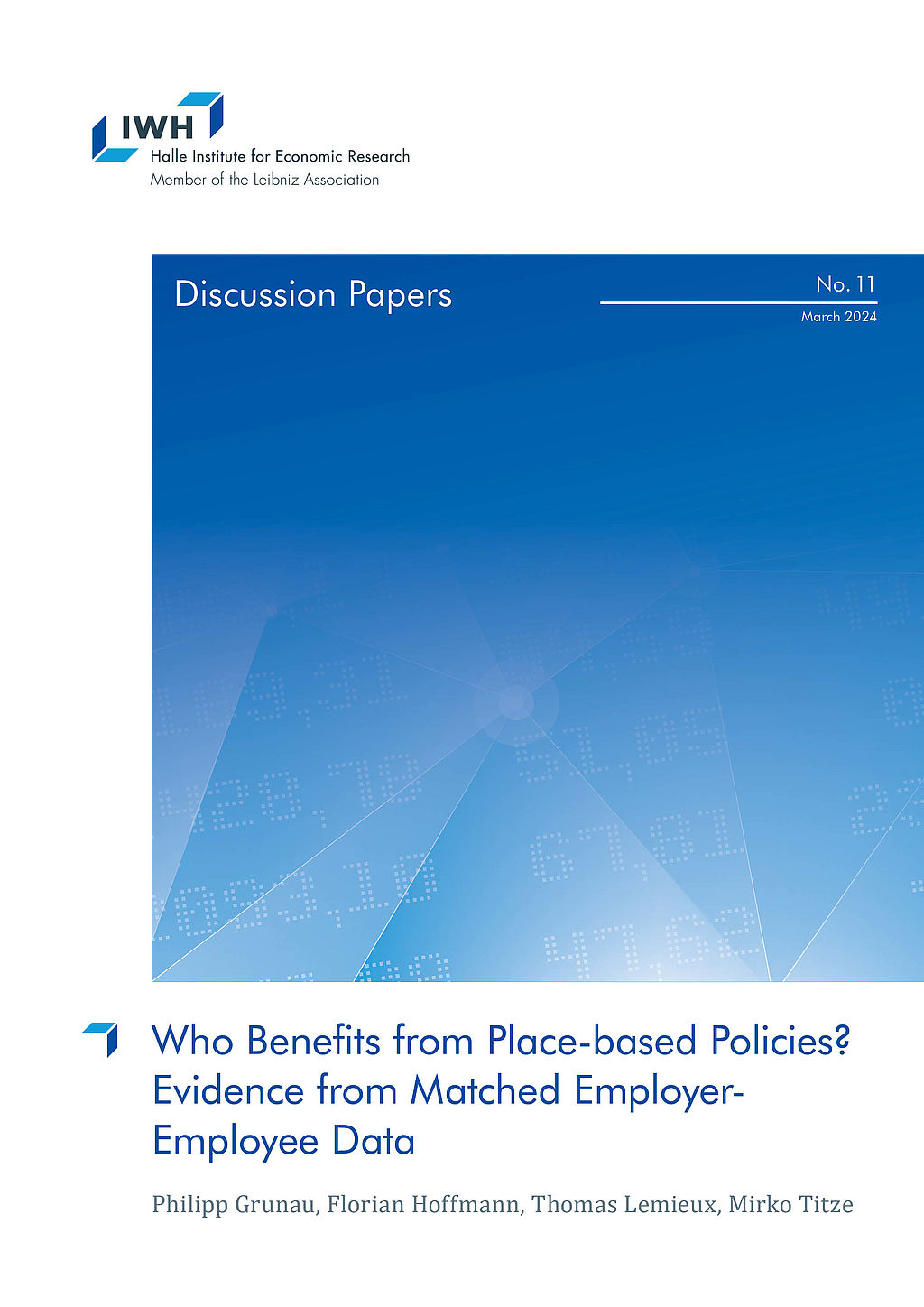
Who Benefits from Place-based Policies? Evidence from Matched Employer-Employee Data
in: IWH Discussion Papers, Nr. 11, 2024
Abstract
We study the wage and employment effects of a German place-based policy using a research design that exploits conditionally exogenous EU-wide rules governing the program parameters at the regional level. The place-based program subsidizes investments to create jobs with a subsidy rate that varies across labor market regions. The analysis uses matched data on the universe of establishments and their employees, establishment-level panel data on program participation, and regional scores that generate spatial discontinuities in program eligibility and generosity. These rich data enable us to study the incidence of the place-based program on different groups of individuals. We find that the program helps establishments create jobs that disproportionately benefit younger and less-educated workers. Funded establishments increase their wages but, unlike employment, wage gains do not persist in the long run. Employment effects estimated at the local area level are slightly larger than establishment-level estimates, suggesting limited spillover effects. Using subsidy rates as an instrumental variable for actual subsidies indicates that it costs approximately EUR 25,000 to create a new job in the economically disadvantaged areas targeted by the program.
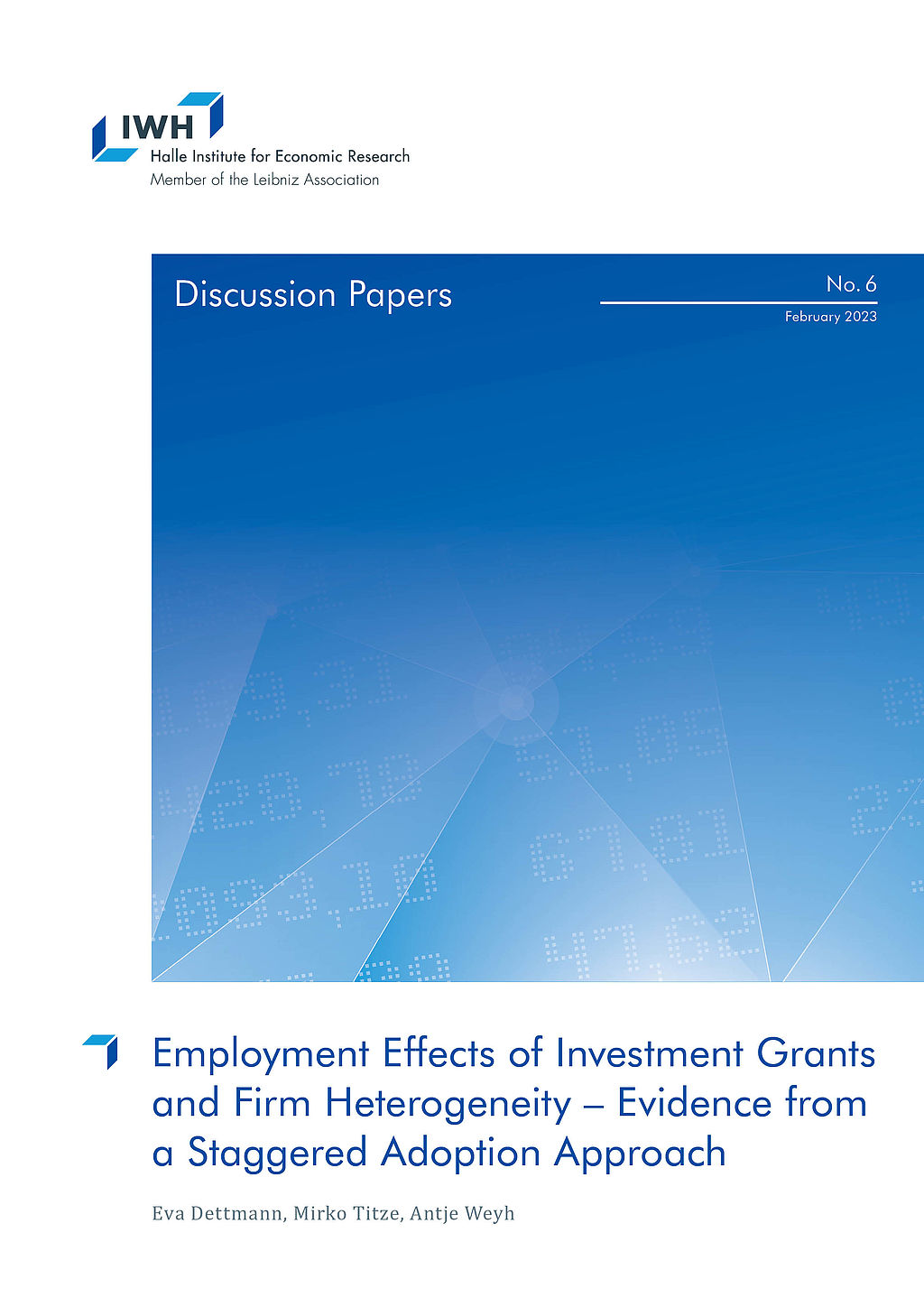
Employment Effects of Investment Grants and Firm Heterogeneity – Evidence from a Staggered Adoption Approach
in: IWH Discussion Papers, Nr. 6, 2023
Abstract
This study estimates the establishment-level employment effects of investment grants in Germany. In addition to the average treatment effect for the treated, we focus on discrimination in the funding rules as potential source of effect heterogeneity. We combine the difference-in-differences approach of Callaway and Sant’Anna (2021) that explicitly models variation in treatment timing with a ties matching at the cohort level. We observe a positive effect of investment grants on employment development in the full sample. The subsample analysis yields strong evidence for effect heterogeneity due to firm characteristics and the economic environment.
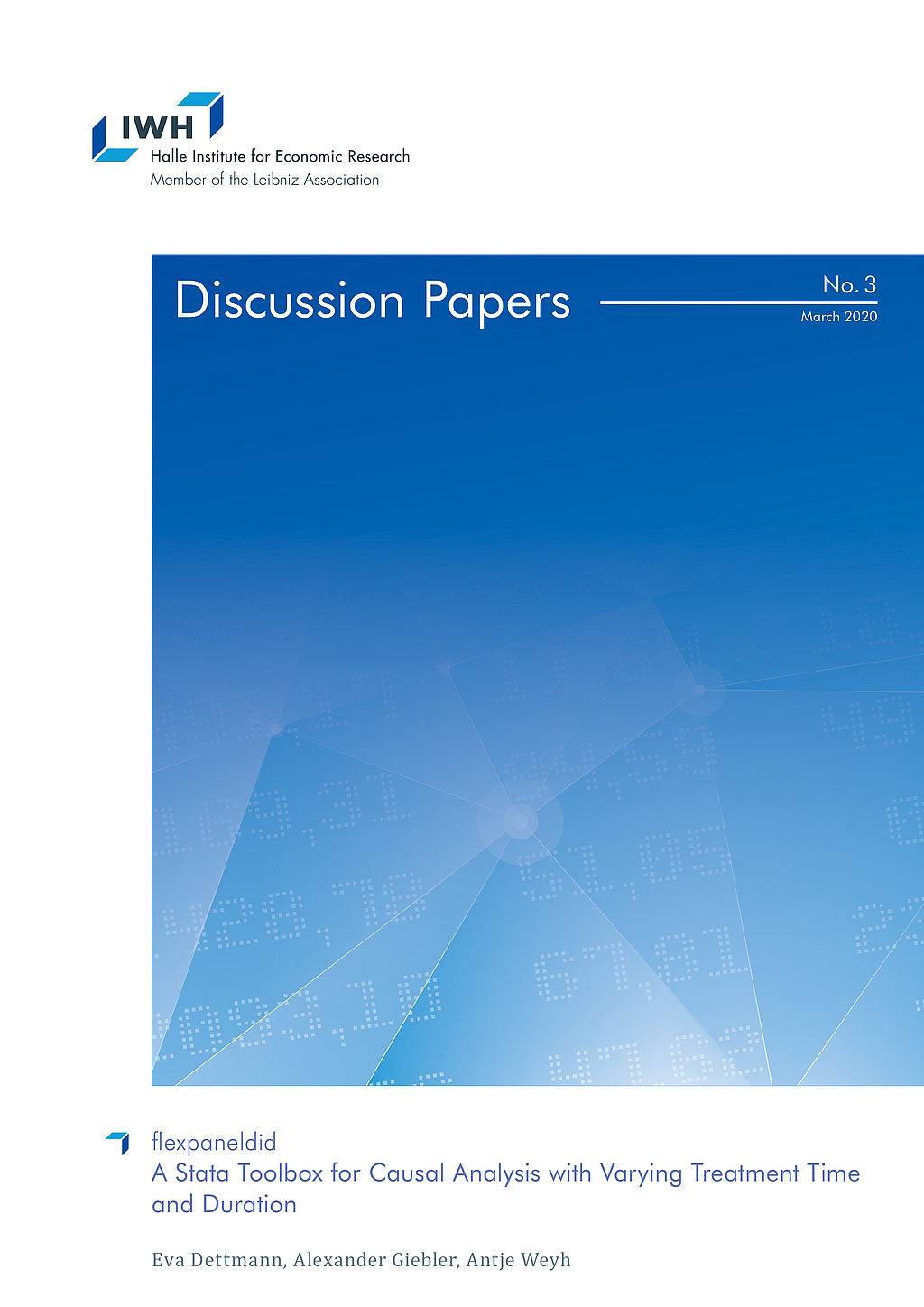
flexpaneldid: A Stata Toolbox for Causal Analysis with Varying Treatment Time and Duration
in: IWH Discussion Papers, Nr. 3, 2020
Abstract
The paper presents a modification of the matching and difference-in-differences approach of Heckman et al. (1998) for the staggered treatment adoption design and a Stata tool that implements the approach. This flexible conditional difference-in-differences approach is particularly useful for causal analysis of treatments with varying start dates and varying treatment durations. Introducing more flexibility enables the user to consider individual treatment periods for the treated observations and thus circumventing problems arising in canonical difference-in-differences approaches. The open-source flexpaneldid toolbox for Stata implements the developed approach and allows comprehensive robustness checks and quality tests. The core of the paper gives comprehensive examples to explain the use of the commands and its options on the basis of a publicly accessible data set.
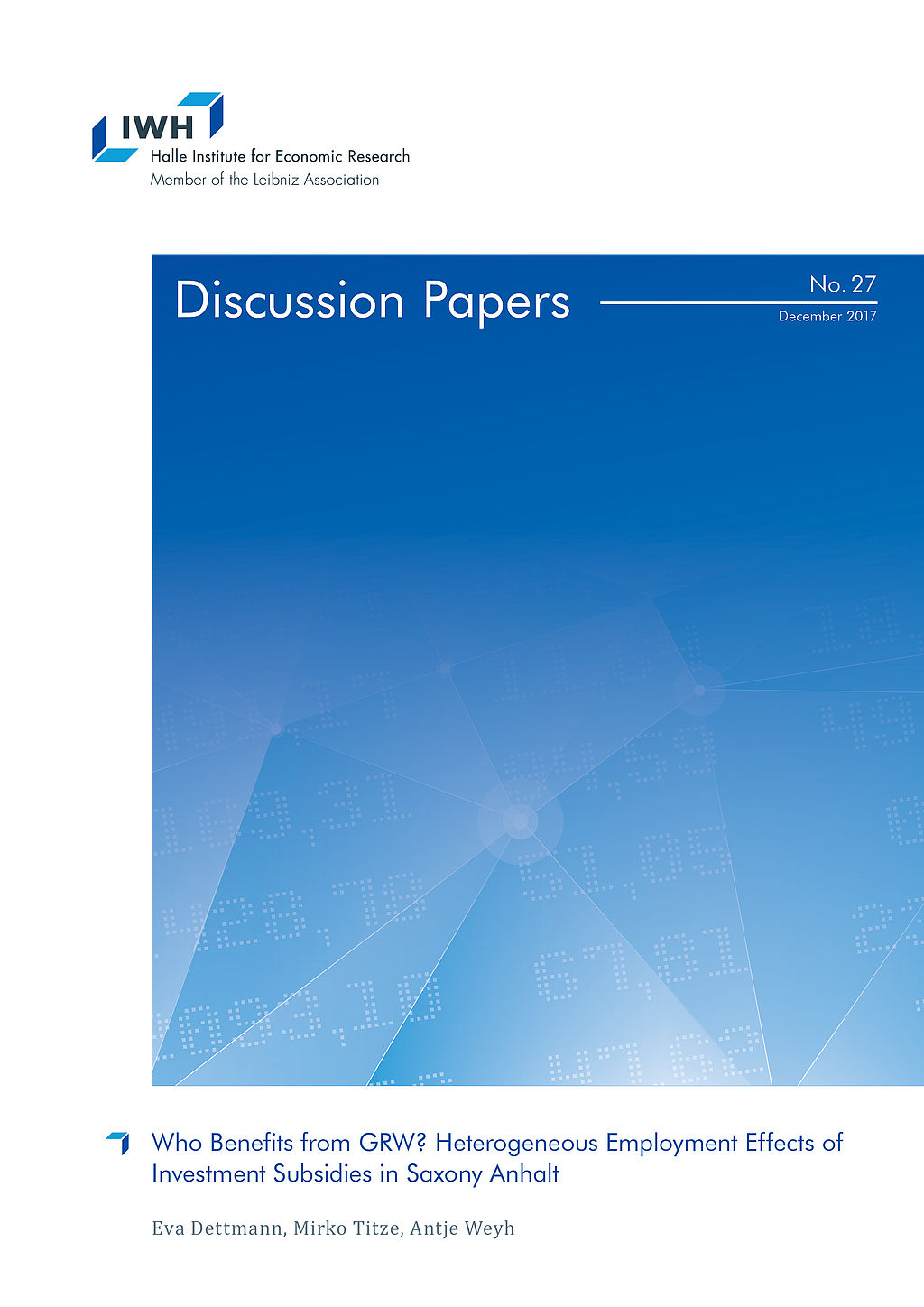
Who Benefits from GRW? Heterogeneous Employment Effects of Investment Subsidies in Saxony Anhalt
in: IWH Discussion Papers, Nr. 27, 2017
Abstract
The paper estimates the plant level employment effects of investment subsidies in one of the most strongly subsidized German Federal States. We analyze the treated plants as a whole, as well as the influence of heterogeneity in plant characteristics and the economic environment. Modifying the standard matching and difference-in-difference approach, we develop a new procedure that is particularly useful for the evaluation of funding programs with individual treatment phases within the funding period. Our data base combines treatment, employment and regional information from different sources. So, we can relate the absolute effects to the amount of the subsidy paid. The results suggest that investment subsidies have a positive influence on the employment development in absolute and standardized figures – with considerable effect heterogeneity.
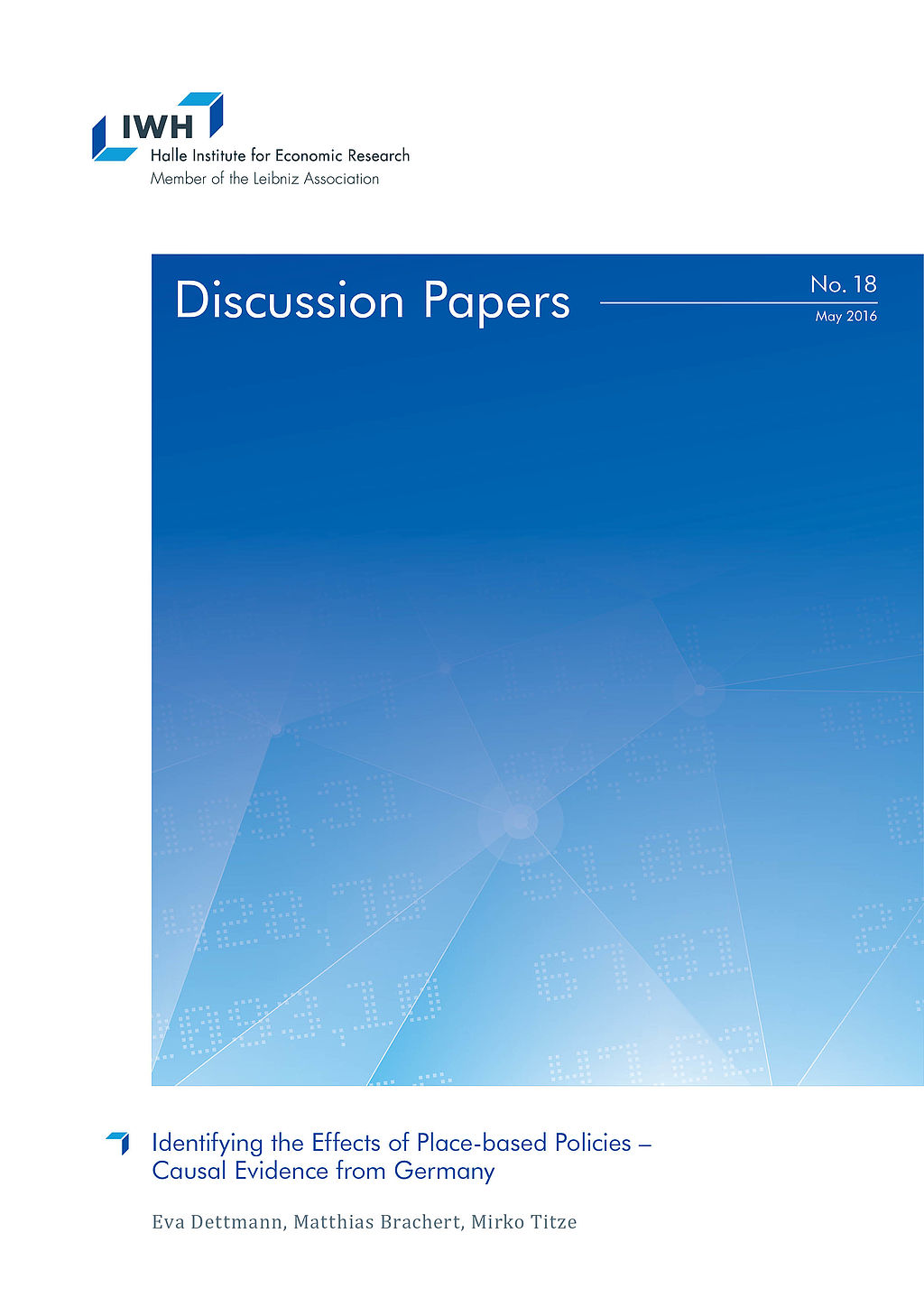
Identifying the Effects of Place-based Policies – Causal Evidence from Germany
in: IWH Discussion Papers, Nr. 18, 2016
Abstract
The German government provides discretionary investment grants to structurally weak regions to reduce regional disparities. We use a regression discontinuity design that exploits an exogenous discrete jump in the probability of receiving investment grants to identify the causal effects of the investment grant on regional outcomes. We find positive effects for regional gross value-added and productivity growth, but no effects for employment and gross wage growth.














